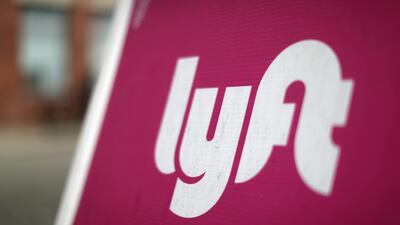Uber-rival Lyft is transitioning its fleet to “100 per cent” electric vehicles by 2030.
The California ride-hailing company will work with millions of drivers in the US and Canada, as well as automakers and rental car companies, to make the switch and cut "tens of millions of metric tonnes" of pollutants from entering the atmosphere. The plan is laid out in a blog post published on Wednesday.
“Now more than ever, we need to work together to create cleaner, healthier and more equitable communities,” John Zimmer, co-founder and president of Lyft, said in a statement. “Success breeds success, and if we do this right, it creates a path for others.”
With no industry left untouched by the Covid-19 pandemic, EV demand is forecast to "stagnate" in the US over the next several years, according to consultancy McKinsey. Factors like rolled back regulations on emissions standards and lower oil prices are the main factors.
It will be "a big challenge to get all of [Lyft's] drivers to switch to electric vehicles," according to Silicon Valley media outlet FutureCar.
Electric vehicles accounted for just under 2 per cent of all new vehicles purchased in 2019. They tended to cost more than conventional vehicles, with four out of five of EVs sold in the US purchased from Tesla, according to FutureCar.
Still, Lyft said the environmental imperative demanded action, and sounded a note of optimism on regulation to make EVs cost-competitive with their gas-powered counterparts.
"With transportation recently overtaking electricity as the single largest source of planet-disrupting greenhouse gas (GHG) pollution in the US and the second-largest source in Canada, we believe now is the time for Lyft to lead a radical shift in strategy," the company said.
"If policymakers do their part in the next few years, EVs should reach cost parity with gasoline vehicles by mid-decade," it added.
Uber has not made a similar blanket commitment to EVs, however it partially subsidises electric car purchases for its London drivers, where regulations are more stringent. While it piloted an EV incentive programme in North America beginning in 2018, it never went beyond the initial trail, according to The Verge.
Lyft will start pursuing its ambitious target by converting its Express Drive rental car programme to an all-electric fleet, first by making EVs available to rent at an equal or lesser cost than a gasoline vehicle, according to a white paper the company released this week. It is targeting this shift in its 10 biggest markets by 2023.
But getting drivers, who work as independent contractors and drive their own personal cars, will be the costliest and biggest change.
Lyft did not disclose the amount it plans to invest in incentives. The company said it plans to develop "demand-side interest in EVs and negotiate with auto manufacturers for group discounts for drivers using the Lyft platform”.
Lyft's efforts coincide with the world's biggest auto makers, including General Motors, Volkswagen and the Mitsubishi-Nissan-Renault alliance, making plans to roll out entirely electrified lineups in the next several years.


